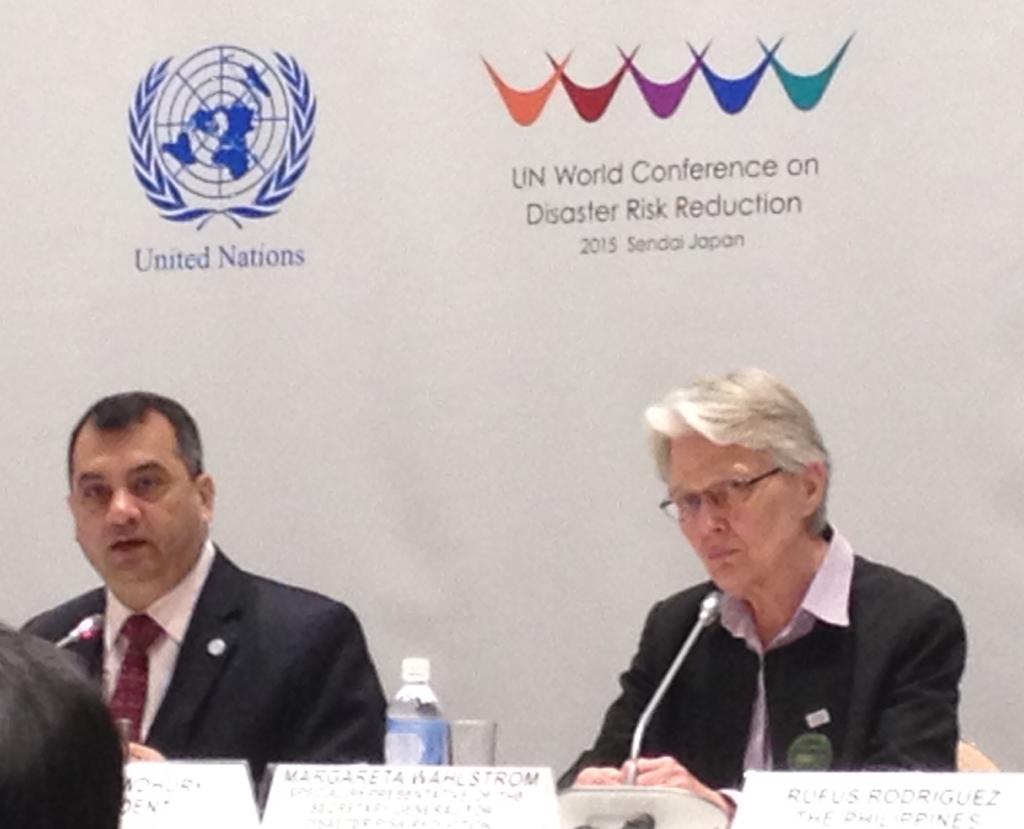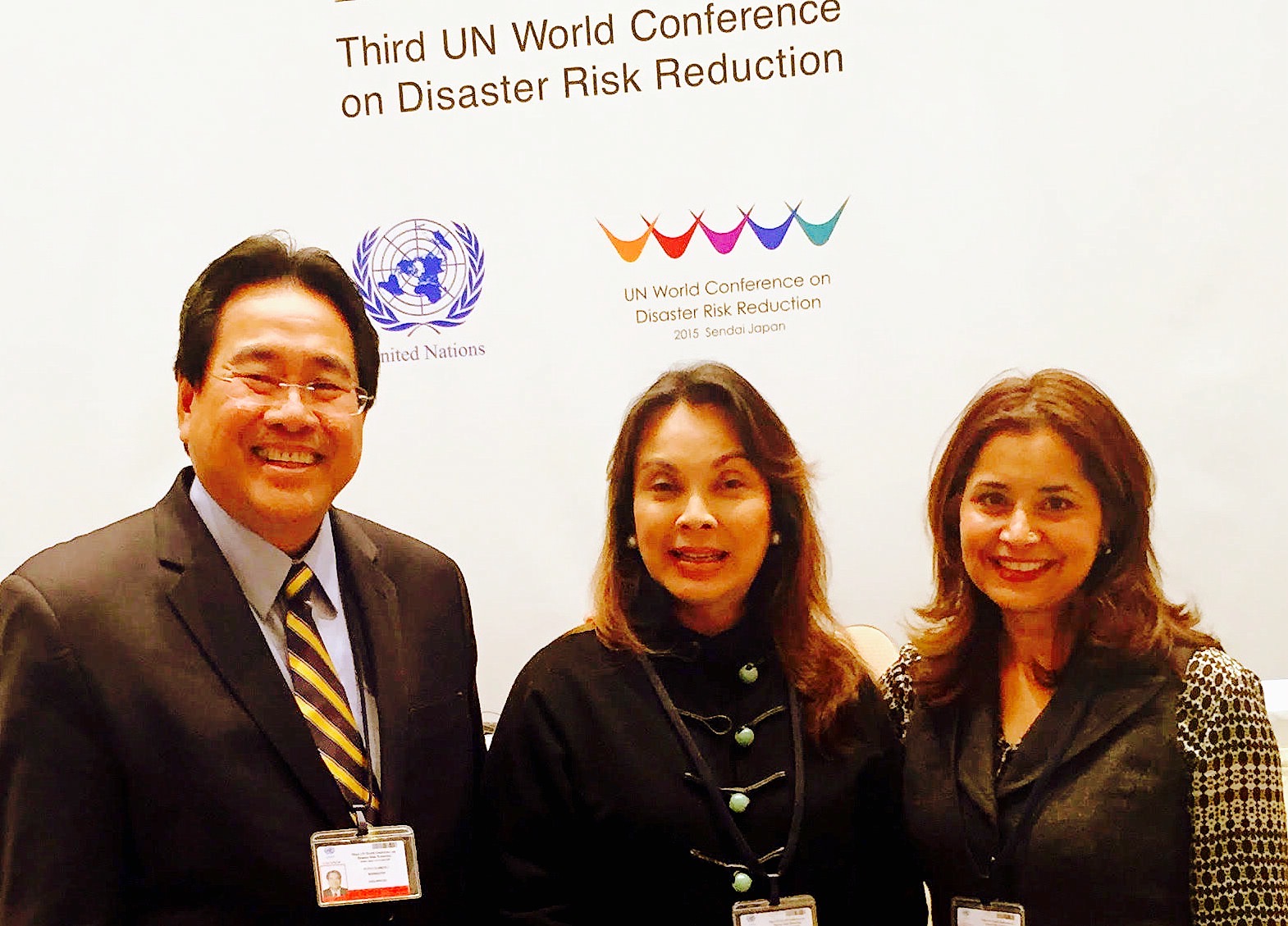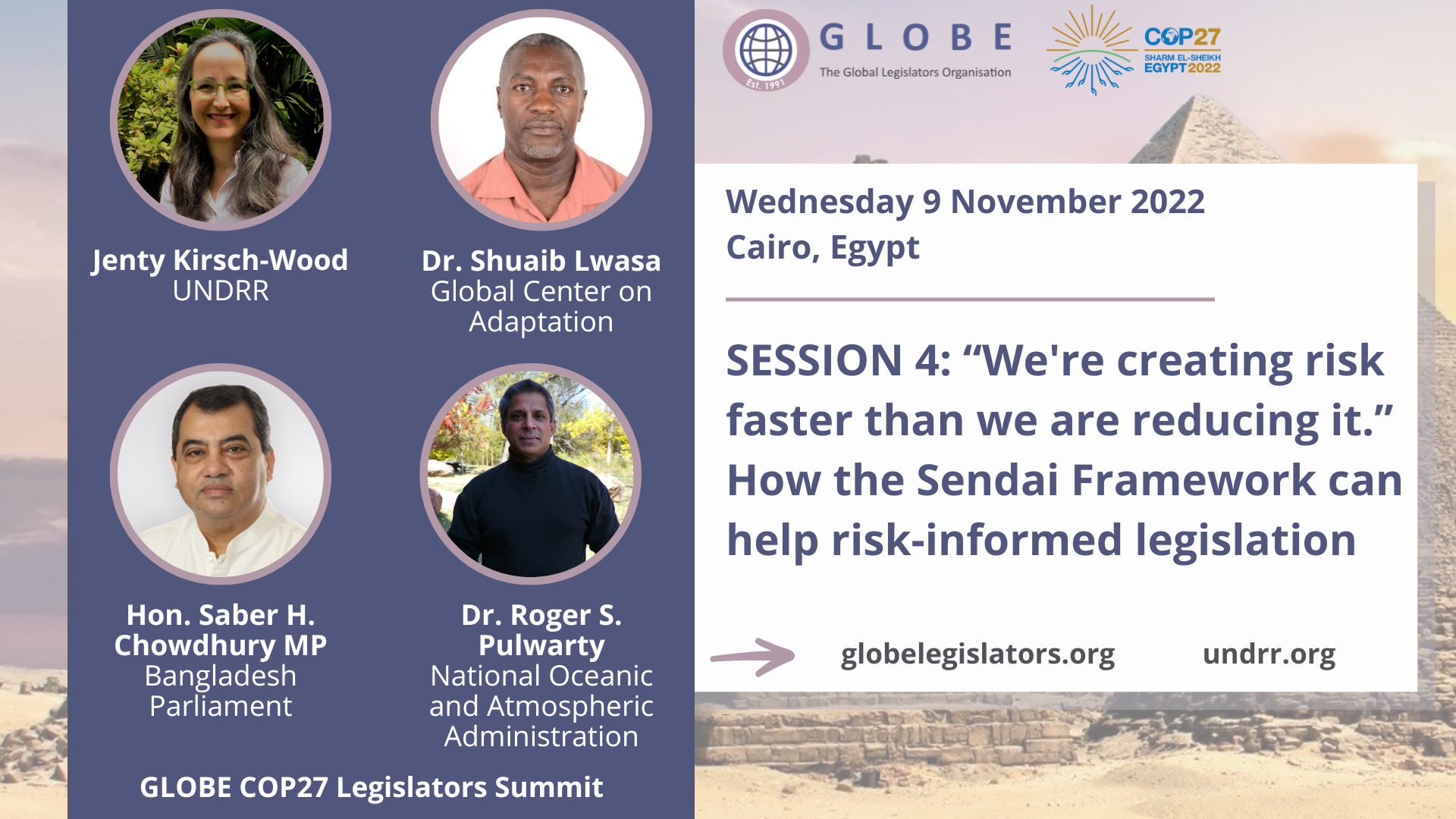
The COVID-19 pandemic dramatically underscored the consequences of failing to anticipate, understand and better manage risk. Parliaments along with other organs of governance need to play a much more proactive and effective role in better managing systemic risks.

of the 2015 agreements, by parliamentarians.
Parliaments have an important role to play in creating legal frameworks that promote sectoral integration and greater efficacy, including through policy scrutiny and budgetary oversight of governments to ensure impact and value for money for the public purse.
A key objective is to connect, integrate and build greater synergy, coherence and efficacy amongst different communities such as the climate, DRR, hydromet, development and humanitarian communities, who are working on parallel and complementary agendas, but too often in silos and lacking in mutual understanding or committed to collective action.
An important area of focus for GLOBE’s work with parliamentarians in 2023 – strengthened by the outcomes of COP27 – will be on the climate resilience and loss and damage agenda for all nations.
WHY RISK GOVERNACE MATTERS FOR SUSTAINABLE DEVELOPMENT
Over the past twenty years, direct economic losses from disasters have increased globally by more than 150 per cent, with losses disproportionately borne by vulnerable developing countries. Risk is a development issue and risk-informed development is essential for sustainable and climate-resilient development.

Since 2015, with the adoption of the UN’s Sendai Framework for Disaster Risk Reduction (2015-2030), GLOBE’s work on DRR has developed further and engagement with the UN Office for Disaster Risk Reduction, UNDRR (formerly known as UNISDR) has deepened.
WHAT IS THE SENDAI FRAMEWORK?
The Sendai Framework for Disaster Risk Reduction 2015–2030 was the first of the landmark global agreements reached in 2015. Collectively known as the 2030 Agenda agreements, they include the Paris Agreement on Climate Change, the Addis Ababa Action Agenda on Financing for Development, the New Urban Agenda, and the 17 Sustainable Development Goals (SDGs). GLOBE’s Coherence & Convergence programme, adopted in 2015, promotes an integrated approach to these agreements and Transforming our World: the 2030 Agenda for Sustainable Development by parliaments, with a view to improving global governance for sustainable development.
In particular, at an international policy level, the UN system has worked to promote synergies between the Sendai Framework, the Paris Agreement and the Sustainable Development Goals. For example, the monitoring of the Sendai Framework is intended to complement the monitoring of 11 SDG indicators.
THE SENDAI FRAMEWORK CALLS FOR:
“The substantial reduction of disaster risk and losses in lives, livelihoods and health and in the economic, physical, social, cultural and environmental assets of persons, businesses, communities and countries.”

The four priorities of the Sendai Framework are as follows:
Priority 1. Understanding disaster riskDisaster risk management should be based on an understanding of disaster risk in all its dimensions of vulnerability, capacity, exposure of persons and assets, hazard characteristics and the environment. Such knowledge can be used for risk assessment, prevention, mitigation, preparedness and response.
Priority 2. Strengthening disaster risk governance to manage disaster risk
Disaster risk governance at the national, regional and global levels is very important for prevention, mitigation, preparedness, response, recovery, and rehabilitation. It fosters collaboration and partnership.
Priority 3. Investing in disaster risk reduction for resilience
Public and private investment in disaster risk prevention and reduction through structural and non-structural measures are essential to enhance the economic, social, health and cultural resilience of persons, communities, countries and their assets, as well as the environment.
Priority 4. Enhancing disaster preparedness for effective response and to “Build Back Better” in recovery, rehabilitation and reconstructionRisk is increasingly systemic. If we want to reduce risk then we also must be increasingly joined up in our approaches: working cross-sectors, between and within institutions, and ensuring harmony from policy through to activity.
ROLE OF PARLIAMENTARIANS IN IMPLEMENTING THE SENDAI FRAMEWORK
Adopted by all UN Member States, the Sendai Framework recognizes that the State has the primary responsibility to reduce disaster risk but that this duty should be shared with local government, the private sector, and other stakeholders.

Importantly, the Sendai Framework emphasizes an all-of-society approach and explicitly calls on parliamentarians to reduce disaster risks and protect their populations by developing new or enhancing existing legislation, setting appropriate budgets for disaster risk reduction, promoting public scrutiny on DRR and holding governments accountable for DRR actions.
The UNDRR recognises that parliamentarians can also shift their governments’ focus and strategy from disaster response and recovery to disaster risk reduction that extends vertically – from national to the local level, and horizontally – across sectors, departments, and disciplines.
In recent years, GLOBE has deepened its relationship with UNDRR and used numerous opportunities to promote parliamentary awareness of the Sendai Framework, global existential risk, climate security, climate resilience and systemic risk.
Since 2016, Malini Mehra, CEO of the GLOBE International secretariat, has been privileged to serve on the Advisory Body of the Global Assessment of Risk (GAR), the UN’s flagship report, which provides guidance to decision makers on addressing systemic risk. In April 2022, GLOBE’s Ms Mehra, facilitated the virtual launch of the GAR22 Our World at Risk, at UN Headquarters with Deputy Secretary-General Amina Mohamed and Mami Mizutori, the UN Secretary General’s Special Representative on DRR, and in May 2022 moderated the opening high-level panel of the Global Platform on DRR in Bali, Indonesia.
LESSONS OF GAR2022 FOR LEGISLATORS
The 2022 Global Assessment Report on DRR (GAR2022) warns that despite commitments to tackle climate change, build resilience and create sustainable development pathways, current societal, political and economic choices are doing the reverse. Risk creation is outstripping risk reduction. Disasters, economic loss and the underlying
vulnerabilities that drive risk, such as poverty and inequality, are increasing just as ecosystems and biospheres are at risk of collapse. Global systems are becoming more
connected and therefore more vulnerable in an uncertain risk landscape. COVID-19 spread quickly and relentlessly into every corner of the world, and global risks like climate change are having major impacts in every locality. Indirect, cascading impacts can be significant.
To change course, new approaches are needed. This will require transformations in what governance systems value and how systemic risk is understood and addressed. Doing more of the same will not be enough. Without increased action to build resilience to systemic risk, the SDGs cannot be achieved.
Investment in understanding risk is the foundation for sustainable development. However, this needs to link to a reworking of financial and governance systems to account for the real costs of current inaction to address risks like climate change. Without this, financial balance sheets and governance decision-making will remain fragmented and be rendered increasingly inaccurate and ineffective.
2023 – A MAJOR INFLECTION YEAR FOR SUSTAINABLE DEVELOPMENT
The COVID-19 pandemic dramatically underscored the consequences of failing to anticipate, understand and better manage risk. Parliaments along with other organs of governance need to play a much more proactive and effective role in better managing systemic risks. For this reason, GLOBE International is developing a more focussed programme on Risk Governance from 2023 onwards.
2023 is a major inflection year for the international community and GLOBE’s work to promote a Coherence & Convergence on the 2015 Agenda, as it marks the midpoint in the implementation of key sustainable development frameworks agreed in 2015. These include the Sendai Framework for Disaster Risk Reduction 2015-2030, the Paris Agreement, the 2030 Agenda for Sustainable Development and the Sustainable Development Goals (SDGs) amongst others. Failure to develop a risk governance approach will place the entire set of 2015 agreements and Agenda 2030 in jeopardy.
For this reason, the UN General Assembly (UNGA) decided to hold a “midterm review of the implementation of the Sendai Framework 2015-2030” (MTR SF) that would take stock of implementation over the last seven years, allowing the re-examination and redress of our relationship with risk.
THE MID-TERM REVIEW OF THE SENDAI FRAMEWORK (2023)
The Mid-Term Review of the Sendai Framework (MTR SF) will assess progress made, examine challenges experienced in preventing new and reducing existing disaster risk, and explore context shifts and new and emerging issues.
The MTR SF seeks to identify improvements to risk governance, and risk management approaches and mechanisms that are able to contend with 21st century challenges, amplifying and accelerating action in all sectors and at all scales through to 2030 and beyond.
The MTR SF process will conclude at a high-level meeting of the General Assembly in New York from 18-19 May 2023 by adopting a concise and action-oriented political declaration.
The review and political declaration will also inform the SDGs Summit in 2023, the UN Secretary General’s Summit for the Future, the Paris Agreement Stocktake and UNFCCC COP28, and the High Level Dialogue on Financing for Development.
GLOBE’S MTR SF ACTIVITIES FOR PARLIAMENTARIANS
Parliaments have an important role to play in creating legal frameworks that promote sectoral integration and greater efficacy, including through policy scrutiny and budgetary oversight of governments to ensure impact and value for money for the public purse.
A key objective of GLOBE International’s work with parliamentarians is to connect, integrate and build greater synergy, coherence and efficacy amongst different communities such as the climate, DRR, hydromet, development and humanitarian communities, who are working on parallel and complementary agendas, but too often in silos and lacking in mutual understanding or committed to collective action.
GLOBE is working with UNDRR and partners to support the MTR SF process by informing and engaging parliamentarians at the international, regional, national and sub-national levels.
Including in partnership with ICLEI to promote improved multi-level governance and understanding.
Roundtable discussion with Parliamentarians on the Midterm Review of the Sendai Framework
On 4 th October 2022, GLOBE partnered with the United Nations Office for Disaster Risk Reduction (UNDRR) and the Climate Vulnerable Forum Global Parliamentary Group to organise a virtual Roundtable discussion with parliamentarians on the MTR SF.
Attended by parliamentarians from around the world, the virtual Roundtable sought to ensure that the views of Parliamentarians working on various aspects of the risk and
resilience agenda informed and were represented in the MTR SF process.
The discussion focussed on:
- Understanding parliamentarians’ views on the stock take of Sendai Framework implementation over the past seven years in their countries including, successes, challenges, and opportunities; and
- Forward looking strategic direction for the prospective implementation of the Sendai Framework focusing on renovating or strengthening risk governance and management to deal adequately with systemic risks in the 21st century.
The key outcomes of the virtual Roundtable discussion with parliamentarians were:
1. Parliamentarians identified instances where –
a. legislation was enacted to implement the Sendai Framework and established accountable institutions to understand risk and establish funds for disaster risk reduction; and
b. risk governance was applied and climate change adaptation and disaster risk reduction measures converged to mitigate risk.
2. Parliamentarians called for –
a. a need to develop a road map for the financial sectors on how to respond to risk;
b. capacity building for decision makers on disaster risk reduction;
c. the need to realign parliamentary committee for purposes of risk reduction or to establish risk caucuses to address risk reduction;
d. tightening of weak legislation to make corporations accountable for failure to invest in renewable energy over fossil fuels and for corporations that under report when it comes to sustainable financial reports;
e. timely data to make informed decisions.
3. Spatial planning is critical for mapping occupational safety and health hazards as it can further curb challenges such as food security.
4. Parliamentarians proposed that the IPCC Report should include disaster risk reduction to bridge the data and budget gap.
5. Governments should move away from measuring economies through Gross Domestic Product market value to accounting for natural capital.
The Agenda for the virtual Roundtable can be downloaded here.
The full report for the virtual Roundtable can be downloaded here.
GLOBE ACTIVITES AT COP27 – BRINGING DRR AND CLIMATE RISK/ RESILIENCE TOGETHER

COP27 provided an important opportunity to bring together the climate and DRR agendas much more effectively together. The central message echoed by the UN Office for Disaster Risk Reduction (UNDRR) at COP27 was the need to create a world with “Zero Climate Disasters.” At the heart of this approach is the need to reduce emissions to prevent the creation of new climate risks, and the need to accelerate climate change adaptation to manage current and future risks. GLOBE sought to fully endorse this message in its work with Parliamentarians as the UNFCCC Focal Point for the Parliamentary Group throughout the two weeks of COP27.
GLOBE International and UNDRR also collaborated in holding a special session on DRR, climate risk and resilience, and the Midterm Review of the Sendai Framework at the hybrid GLOBE COP27 Legislators Summit on 9 th November 2022.
The contributions to Summit’s SESSION 4 on “We’re creating risk faster than we are reducing it” How the Sendai Framework can help risk-informed legislation, can be viewed below. The presentation of Jenty Kirsch-Wood is available here and that of Dr. Roger S. Pulwarty is available here.lll
